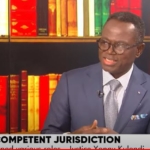
Supreme Court Judge, Justice Emmanuel Yonny Kulendi says a person of depraved morality cannot be given the opportunity to administer justice in the country.
This, he explained is because of the person’s element of impartiality and the need to engender the confidence of the people receiving the verdict.
“A dishonest man should not come anywhere near the sanctuary of justice even at the most basic level. A person of depraved morality who is known among his peers, to be of no good report cannot purport or pretend to administer justice,” he said in an interview on JoyNews’ The Law.
Justice Kulendi made the comments while contributing to the topic “Court of competent jurisdiction” on Sunday, November, 26.
According to the Supreme Court Judge, the minimal requirement to be a Magistrate is for an individual to be a lawyer of good standing. This he says is the technical qualification.
In addition to that, he noted that there is a software standard whereby an individual is required to “have high moral character and proven integrity. This cuts across from Magistrate to the very top because a judge is a judge.”
According to Justice Kulendi, as the judge climbs on the ladder from a Magistrate judge, there are other administrative processes one has to go through before becoming a judge.
“By the time you get to the Circuit Court, the requirement then is that you must be a lawyer of good standing, you must have been practicing law for a minimum of five years and then the software comes in. You have to meet the software standard – character, good standing, proven integrity, etc.,” he added.
He said in order to get to the stage of a High Court Judge, the judge is required to be a lawyer for 10 years at the Bar with other software assets.
He went on to state that “from the High Court to the Court of Appeal, the scale goes up to 12 years and 15 years in the Supreme Court.”



